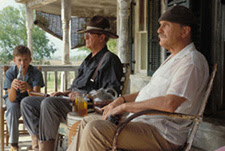I miss black and white. I just
re-read Dalton
Trumbo’s Johnny Got His Gun for the first
time since high school, and it brought me back to those crystal-clear teenage
years when decisions between right and wrong, left or right were as simple as …
well, black and white.
All the answers were right there
on television, most of the time literally in black and white. My dad was Archie
Bunker, and he and his blue-collar
friends wanted to beat up hippies. Blacks in our town waited to join the riots
in Watts. Out-of-town college students were tearing apart campuses (except
for that poor
young girl from Kent State, and older kids from our refinery town just
seemed to disappear (by the way, my dad was very kind and caring, and his
friends never beat up anybody. I kind of doubt if anyone from our town – black
or white – really wanted to start a riot).
In those years during and
immediately after the Vietnam War, young people knew that war was bad. We saw
the photos of a young
girl scorched by napalm and Buddhist
monks igniting themselves in downtown traffic. Thankfully, few draftees
returned to small-town Southeast Texas because we’d heard they all became child killers and
dopers
… our English teachers had us read Joseph Conrad’s Heart of Darkness -- which gave birth to the 1979 movie, Apocalypse Now -- just to prove how easy it was to succumb
to the evils of the jungle.
Saddest reality is of those
soldiers coming back to the United States alone to “welcomes” of spit and
taunts. An entire
generation of veterans mislabeled, abused and neglected.
Vietnam was a “living room war”
during the ‘60s and ‘70s, and its images and casualty scorecards on the evening
news haunted my childhood (fortunately, we always seemed to kill more of them
than they did of us). I dreaded the day that my first trip away from home would
take me straight to the Hanoi
Hilton (my imagination skipped all the middle steps and took me straight to
prisoner-of-war). I was scared to death and scared to die.
Johnny hit bookshelves two days after
the start of World War II in 1939, but it’s set in the earlier 20th
century during World War I. The book was banned in 1941 following the Japanese
attack on Pearl Harbor, although Trumbo wrote that he wasn’t aware of it, and
it was “out of print” during the Korean conflict of the early ‘50s. I first
read it in the early ‘70s after Trumbo added an addendum to the introduction,
where he outlines an equation for figuring the impact of casualties in Vietnam:
“40,000 dead young men = 3,000 tons of bone and flesh, 124,000 pounds of brain
matter, 50,000 gallons of blood, 1,840,000 years of life that will never be
lived, 100,000 children who will never be born.”
Yes, Johnny Got His Gun is that kind of “let’s take this outside”
(except that we’re pacifists) book.
Johnny focuses on Joe Bonham, a
critically wounded, young soldier, who wakes up in a hospital to the
step-by-step reality that he’s lost his hearing … and his arms, and his legs, and
his mouth, nose and eyes. He is unimaginably alone, and his story is written in
a saddening and thought-provoking, stream-of-consciousness ramble that only a
desperate insomniac can appreciate.
Just a relevant as ever, two
points disturbed me as I re-read Johnny
Got His Gun.
·
Somewhere between a quick victory in Gulf War I
and the tragedy of 9/11, America re-gained its identity as a confident,
collaborative nation. Unfortunately, we also made ourselves prime targets for
the mindless sentiment of songs like Lee Greenwood’s “God
Bless the USA” and the hate-breeding machismo of Toby Keith “Courtesy of the Red, White
and Blue.” Disagree? Find a copy of Wag
the Dog with Robert DeNiro and Dustin Hoffman. You’ll
love Willie Nelson’s character.
Trumbo has Joe examining the concept of “liberty” and the
messaging that sends people to war. Joe considers the opportunities men have to
say “no” when asked to run an errand or buy a car, but wonders why no options
are available when he’s asked to die.
He asked about those who are ashamed to say “no,” and ponders,
“What the hell does liberty mean anyhow? It’s just a word like house or table
or any other word. Only it’s a special word. A guy says house and can point to
a house and prove it. But a guy says
come one let’s fight for liberty. He can’t prove the thing he’s talking about
so how in the hell can he be telling you to fight for it?
“No sir anybody who went out and got into front line trenches
to fight for liberty was a goddam fool and the guy who got him there was a
liar.”
No one deserves our genuine support and appreciation more
than military personnel and emergency services providers. However, I was embarrassed
when I found myself critically measuring Joe’s honesty against the currently
accepted norms that pit patriotism against tolerance, and require “undying
loyalty.”
·
Then I became angry … angry with the further
bastardization of American values that preys on fear and mock pride to shut
down cooperation on reasonable gun laws while children are being killed, to
label homelessness and desperation as lazy and unmotivated, to brutalize
families for the sake of a homogenous society, and to cast-aside veterans after
the parades have stopped and the music has changed.
And all for the sake of a word.
Follow me on Twitter: @FWgib

